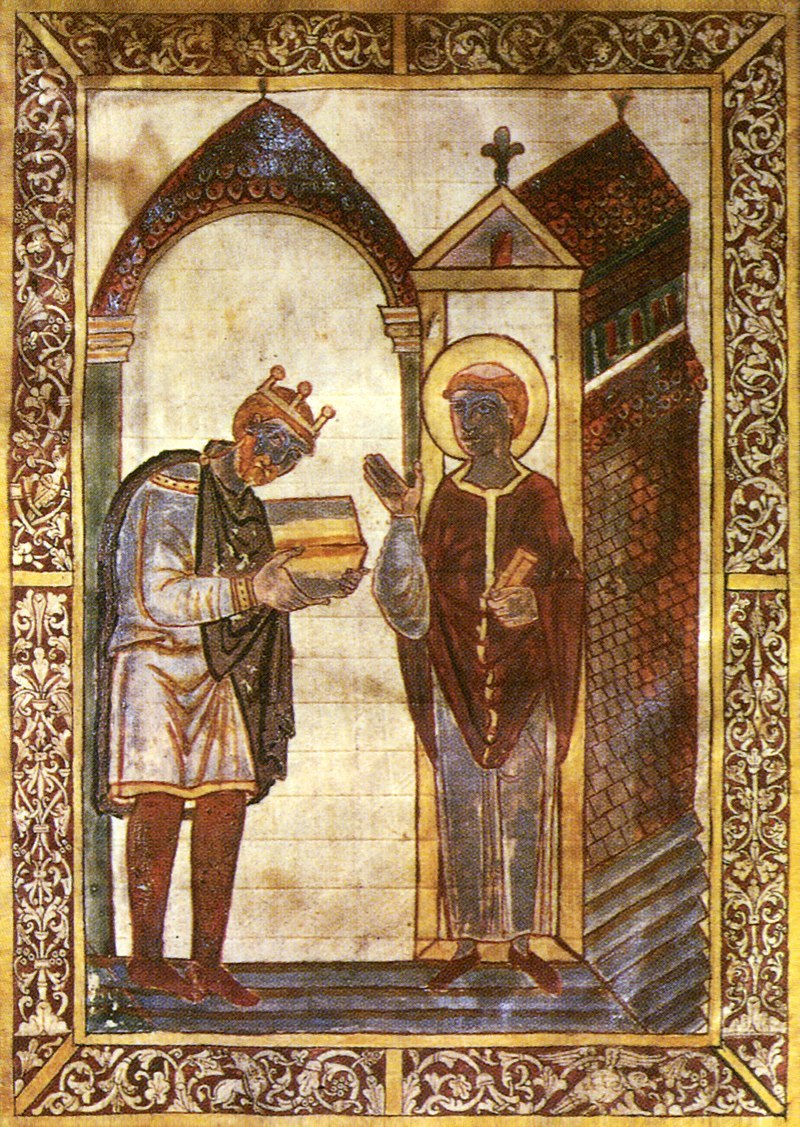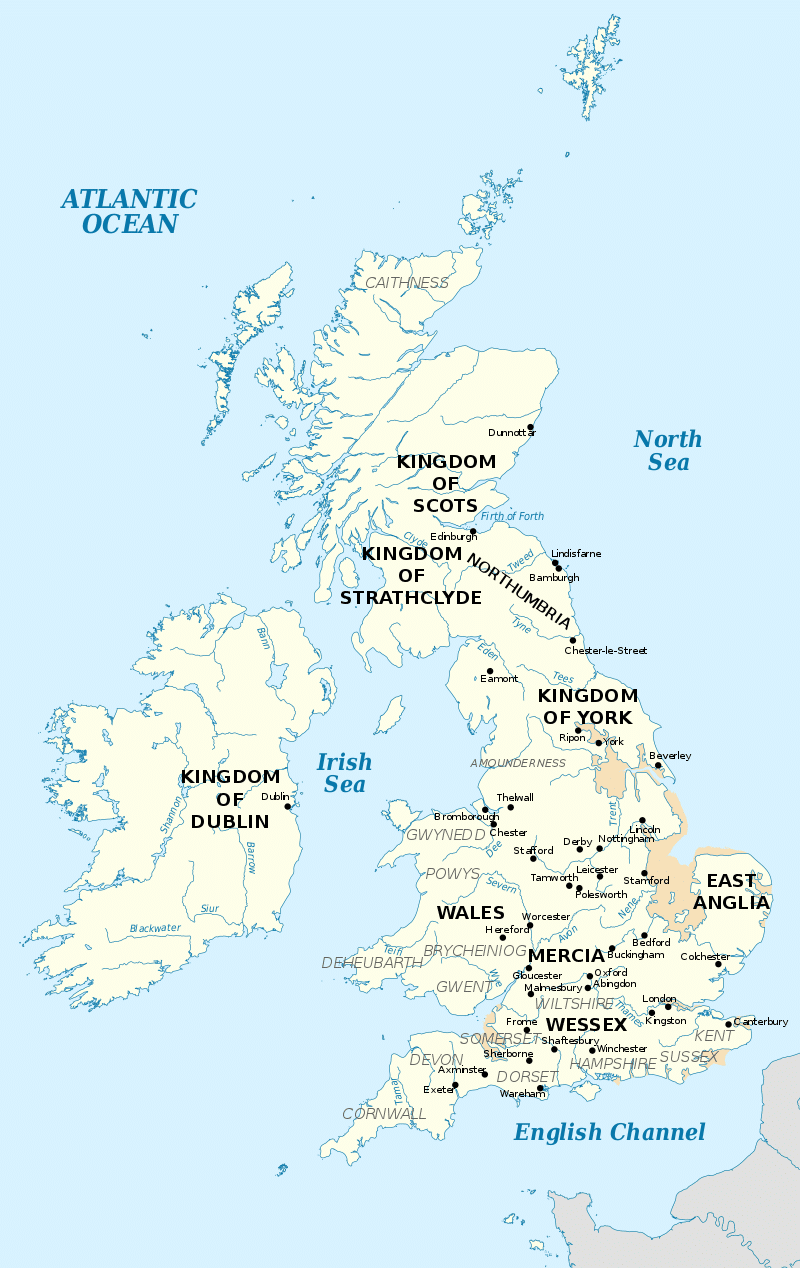King Athelstan was the son of King Edward the Elder and the grandson of Alfred the Great. His mother was Edward's first wife, Ecgwynn.

Ascension to Throne
- He was born around 894. His bother died, and King Edward married again. With his second wife, he had other children, one of which was Aethelweard.
- His father died in 924 without an official heir to the throne.
- Aethelstan's younger brother, Aethelweard, claimed the throne.
- Aethelweard's claim was supported by Wessex, while Aethelstan's claim was supported by Mercia.
- Aethelweard suddenly died 3 weeks after Edward the Elder's death.
- Aethelweard's death allowed Aethelstan to claim the throne of Wessex and Mercia.
- Aethelstan banished another brother, Edwin, from the kingdom. He feared that Edwin would make a claim on the throne, so he set him adrift without any provisions. Edwin was never seen again and is believed to have drowned.
Reign and Reforms
- Aethelstan regretted his actions towards his brother. It would be the darkest moment of his reign.
- He began a series of reforms and charitable efforts. He used a portion of the income from each of his estates to support the poor.
- He also reformed the law to make it more lenient and fair for young offenders. This allowed youth to have second chances instead of losing their life or reputations from a bad decision.
- He continued to expand Alfred the Great's legal reforms and began to focus on areas of poverty where lawlessness and robbery seemed to be common.
- He believed in education and the power of religion. He founded churches across his kingdom and collected many holy relics that would raise the morale of the local population.
- He also betrothed many of his sisters to European rulers, which strengthened relations with other foreign powers.
Military Accomplishments

- As previously mentioned, betrothing his sisters allowed him to forge better relations with foreign powers, which helped with national security.
- In 926, King Aethelstan conquered Northumbria.
- The same year, his sister Edith married Sihtric, the King of York. Sihtric died the next year, which gave Aethelstan the leverage needed to take the city of York.
- He strengthened his kingdom further by sending his sister Edith to marry the Holy Roman Emperor.
- Sihtric's cousin Gurthfrith tried to retake the throne of York for his family, but Aethelstan defeated him. The Danes soon submitted to his rule.
- On July 12, 927, a year after he claimed the throne of York, an important meeting took place. At the meeting, the kings of Scotland, Deheubarth, Bamburgh, and Strathclyde, agreed to submit to Aethelstan as their overlord.
- He could not be called the 'King of the English.'
Battle of Brunanburh
- Despite accepting Aethelstan as their overlord, they did not fully submit to his rule.
- Aethelstan briefly forced tribute from the Scottish king, Constantine II, when he invaded in 934. During this conquest, he soundly defeated the Scottish on land and sea.
- Three years later, the Scottish retaliated and allied themselves with the kingdoms of Strathclyde and Dublin.
- Aethelstan was accompanied by his younger half-brother Edmund at the Battle of Brunanburh.
- Aethelstan successfully defeated Constantine II and his allies he established complete control over most of England. The only portion he did not control was the Celtic kingdom of Cornwall.
- He became the ruler of all Anglo-Saxon people in Britain. He had expanded the kingdom further than Alfred and Edward.
- Nobility from Scotland and Wales attended assemblies at his court and witnessed royal charters.
Death and Division
- Athelstan died on October 27, 939, at Gloucester. He was buried at Malmesbury Abbey.
- Aethelstan was a strong yet wise ruler. However, like many Anglo-Saxon kings, the structure of his kingdom was not set up well after his death.
- Just two years after the Battle of Brunanburh and the unification of Anglo-Saxons, Aethelstan died, which was not enough time to establish an infrastructure that could sustain his expansions.
- Anglo-Saxon control of northern England collapsed, and both Edmund and Eadred spent their reigns trying to take back control.
Legacy
- Aethelstan's reign is often compared to Alfred's by historians. He expanded the kingdom further and established many social reforms. He is generally considered the first true King of England and the father of medieval England.
- He established a strong central rule in England.
- He laid the foundation for monastic reform
- He established an efficient system of government, justice, and administration that would aid in his expansion and increase England's economic wealth.
- Aethelstan's accomplishments were well-known during his lifetime and for a few centuries after his death, but by the time of the Victorian Age, his contributions had been buried due to the legacy of King Alfred.
